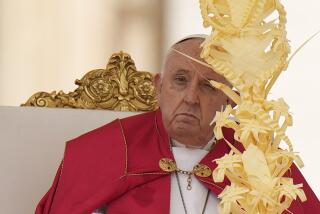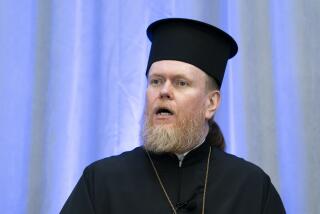In Poles, Pope Finds Renewed Energy
- Share via
GORZOW, Poland — He climbed the altar with a cane and spoke with a weary voice, slurring his prayers. The 300,000 worshipers kept interrupting. “We love you!” they chanted. Slowly, Pope John Paul II regained his vigor.
He recalled the prediction 19 autumns ago by his mentor, the late Cardinal Stefan Wyszynski, that he, the just-elected Polish pope, would lead the Roman Catholic Church to the year 2000. Then the stooped figure, a distant white speck to many who heard him, electrified the crowd.
“I am growing in years,” he said. “I come to ask, as I walk the road to the millennium, for the grace to fulfill this task that God put before me. I ask you to beg God, on your knees, that I will be able.”
“We’ll help you!” the faithful chanted, then burst into “Sto Lat,” a song meaning “May you live 100 years.”
On a pilgrimage across Poland, the 77-year-old pope is drawing energy from some of the biggest, warmest audiences of his seven papal homecomings. The turnout has as much to do with wrenching changes in this former Communist nation as with the drama of his own perseverance.
Since the 11-day visit began May 31, millions of Poles have flocked to his outdoor Masses. Organizers say they are equally struck by the intimacy of the crowds, whose adoring chants draw the pope from rigid text to spontaneous dialogue.
It is a rapport not evident since the papal pilgrimages of 1979, 1983 and 1987, which stirred heavily Catholic Poland and undermined decades of Communist rule.
By the time of John Paul’s last extended visit, in 1991, the church-backed Solidarity movement was in government and the politically assertive clergy was a divisive force. The pope’s stern moralizing to the young democracy unsettled many Poles, and he lost his temper with thinning, unresponsive crowds.
“In 1991, we thought we knew more about democracy than anyone else in the world,” said Jerzy Klechta, a media advisor to then-President Lech Walesa, the Solidarity union leader since voted out of office. “The pope spoke, but we listened to ourselves.
“Today we feel a little lost because of all the changes we’ve been through,” he added. “Today we want his help.”
*
In his labor to shape the third millennium of Christianity, few testing grounds are as important to John Paul as the Slavic nation that shaped him. Today’s Poland exemplifies much of what the globe-trotting pope is crusading against.
Former Communists now running the country have liberalized the strict antiabortion law of the Solidarity years. Poles’ embrace of capitalism has brought rapid growth but also homelessness, double-digit unemployment, a higher crime rate, a wider gap between rich and poor. Anti-Semitism lingers. Many question the clergy’s right to speak out on social and political issues.
His voice is less strident now, but John Paul’s message is unchanged.
“Confusion in the moral sphere,” he declared last week, threatens Poland’s new freedom, and the church has a mission to save it. He appealed for laws to ease the “anxiety, pain and misery” of the poor and warned entrepreneurs not to be “deceived by visions of immediate profit at the expense of others.”
Broadening his idea of justice, he urged richer Western Europeans to break down an “invisible wall” keeping Poland and others emerging from communism out of the European Union. To underline that point, he brought the presidents of Germany and six former Soviet Bloc nations together for a Mass at Gniezno.
He asked Poles to join with Jews in remembering a common past of “terrible death” in the German extermination camps on Polish soil during World War II.
And he stepped into a debate over religion in Polish life, saying the crucifix is a reminder of “our Christian dignity and national identity” that should stay on display in public schools, offices and hospitals.
Father Maciej Zieba, who helped prepare for this pilgrimage, said John Paul is determined to make Poland a model--a democratic, free-market society based on Christian values that grow from open discussion in which the clergy has a voice.
“The past few years have been painful for him,” Zieba said. “He couldn’t understand why the free, independent Poland that he dreamed of for decades would not listen, why there was so much opposition, why the church couldn’t carry out a program.”
It turned out, the priest said, that Poles didn’t really know native son Karol Wojtyla or his teachings as John Paul II all that well. Zieba’s Third Millennium Institute put out three books and a four-month television series on the pope as part of a church-sponsored media buildup.
“Poles have only begun to realize what a great gift from providence he is for us,” said Zbigniew Nosowski, deputy editor of Wiez, a Catholic monthly.
John Paul came better briefed about Poland too, not wanting to divide his countrymen or enter a preelection fray. He met Walesa, the leading opposition figure, but only for a brief chat before the Black Madonna icon in Czestochowa, Poland’s holiest Catholic shrine.
Even on abortion, John Paul sounded defensive as he repeated his pained reaction to the liberalization of the Polish law last autumn--”A nation that kills its own children has no future.”
Poles are listening attentively, drawn as much by the squinting, white-haired messenger as by the message. They stand for hours in fields, parks and town squares, singing and flying yellow Vatican flags until the papal helicopter whirls into view. Then they grow silent, some falling to their knees and weeping as John Paul parts the crowd on a path to the altar.
“Such an incredible moment, you can feel vibrations in the air!” exclaimed Krzysztof Gonet, the mayor of Nowej Soli, who turned up at a papal Mass in nearby Legnica.
His town’s allocation from the national budget has dwindled in recent years, he said, forcing him to trim social services. “Maybe the pope can tell us what we’re doing wrong,” he added.
Poles who became devout Catholics after hearing the new pope 18 years ago are bringing their children to see him, hoping that he can repeat the magic.
More skeptical Poles call the devotion hypocritical, saying that many Catholics who rally with the pope today will go back to ignoring him tomorrow.
“Polish Catholicism is fervent and widespread but very superficial,” wrote Stanislaw Swik, deputy editor of the newspaper Trybuna, who also took government leaders to task for joining the uncritical welcome. “Instead of meeting open minds, the pope is encountering intellectually paralyzed admirers.”
Indeed, many of the scores of worshipers interviewed after papal Masses last week said they were struck less by what they heard than by the emotion of watching a great man on what may be his last visit home.
Although there is talk of a papal visit next summer, John Paul’s frailty is evident. Since his 1991 trip, he has undergone surgery for a colon tumor and a hip replacement. Polish television showed the near-constant tremor in his left hand that many consider a symptom of Parkinson’s disease.
“He sees his physical weakness and knows that he needs a spiritual power to carry on,” said Father Jurek Limanowska, a Polish organizer of the pilgrimage. “Maybe we Poles can help by praying. But more important, we shouldn’t act in ways that make him sad.”
More to Read
Sign up for Essential California
The most important California stories and recommendations in your inbox every morning.
You may occasionally receive promotional content from the Los Angeles Times.










